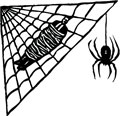

<<<Web
of Lies Photosearch
illustration...
Logical Fallacy:
Methodological Error in a Process of Reason
Abstractions
Accent: emphasis on a word or phrase suggests contrary
meaning
Accident: generalization applied when circumstances
suggest exception

Ad Hominem: /
Ad Hominem (Argument
To The Man) /
Ad Hominem Tu Quoque
Ad
hominem
or ATTACKING THE PERSON. Attacking the arguer rather than
his/her
argument. Example:
His objections to capital
punishment carry no weight because
he is a convicted felon.
Ad
ignorantium or APPEAL TO IGNORANCE. Arguing on
the basis of what is not known
and cannot be proven. (Sometimes
called the “burden of proof” fallacy). If you
cannot prove that something is true then
it must be false (and vice versa).
Example: You
can't prove there isn't a Loch Ness Monster, so there must
be one.
Affirming the Consequent: If
A then B, B, therefore A. In
AFFIRMING THE
CONSEQUENT (An invalid form of the
conditional argument), the second premise
affirms the consequent of the first
premise and the conclusion affirms the
antecedent. Example:
If he wants to get that job, then
he must know Spanish. He
knows Spanish, so the job is his.
Amazing Familiarity
Ambiguous Assertion
Amphiboly:
With
amphiboly, the structure of a sentence allows two
different
interpretations.
Syntactical ambiguity involving the position of words in a
sentence or the juxtaposition of two
sentences that leads to communication of
an erroneous idea. This fallacy is
like equivocation except that the ambiguity
does not result from a shift in meaning
of a single word or phrase, but is created
by word placement. Example:
Jim said he saw Jenny walk her dog through the
window. [This was supposed to relate
Jim’s sighting of Jenny through the window,
not Jenny’s passing bodily through the
window.]
Analogies
Anonymous Authority: the authority in question is not
named
Appeal to Authority:
In appeals to authority fallacies it might be argued
that the
authority is not an expert in the field, experts in the field disagree,
or it might be
claimed that the authority was joking, drunk, or not being serious.
An
Ad
Verecundiam
or APPEAL TO AUTHORITY
is a deliberate attempt to convince the
listener by appealing to the reputation
of a famous or respected person. Often
manifested by an authority in one field
speaking out of his or her field of expertise.
Example: Sports
stars endorsing investment firms. Or, a TV commercial by an
actor
who claims, "I'm not a doctor, but I play
one on TV."
Appeals To Anonymous Authority,
Authority,
Belief,
Coincidence,
Common Practice,
Complexity,
Consequences of a Belief,
Emotion,
False Authority,
Fear,
Force,
Forces,
Flattery,
Motives,
Novelty,
Pity,
(pity),
Popularity,
Ridicule,
Spite,
Sympathy(The Galileo Argument),
Tradition, or
Widespread Belief
(Bandwagon, Peer Pressure) .
Appeal to
emotion:
Deliberate introduction
of emotional devices in place of logical
assertions to persuade the listener. The
fallacy can appeal to various emotions
including pride, pity, fear, hate,
vanity, or sympathy. Generally, the issue is
oversimplified to the advantage of the
arguer.
Argument By Emotive Language (Appeal To
The People), Fast Talking,
Generalization,
Gibberish (Bafflement),
Half-Truth (Suppressed
Evidence),
Laziness (Argument By Uninformed
Opinion),
Personal
Charm,
Pigheadedness (Doggedness),
Poetic Language,
Prestigious
Jargon,
Question,
Repetition (Argument Ad Nauseam),
Rhetorical
Question,
Scenario,
Selective Observation,
Selective Reading,
or
Slogan.
Argument From Adverse Consequences
(Appeal To Fear, Scare Tactics),
Age (Wisdom of the
Ancients), Authority,
False Authority,
Small
Numbers, or
Spurious Similarity.
Argument Of The Beard
Argument of the Beard
Argument To The Future
Attacking the Person: person's character attacked, circumstances noted,
or
irrelevant claim that person does not practice what is preached.
Bad Analogy
Bandwagon
Begging the Question: When begging
the question: the truth of conclusion is
assumed by begging a
question, assuming an answer, or positing a tautology
When
begging the question, an argument is advanced where conclusion is
implied
or already assumed in the premise. Also
said to be a circular argument. Example:
Of course the Bible is the word of God.
Why…? Because it says so in the Bible.
Biased Sample
Black
or white
Burden of Proof In burden of proof
fallacy, arguer falsely claims should win by default
Catchall Explanation
Category Errors
Causal Fallacies
Causal Reductionism (Complex Cause)
Changing the
Subject by Digression, Red
Herring, Misdirection, or False Emphasis)

Circular Definition (definition includes term
being defined)
Circular Argument
Circumstantial Ad Hominem
Cliché Thinking
Common Belief
(Sometimes called the “bandwagon” fallacy or “appeal to
popularity”). Assertion of a statement to
be true on evidence that many other
people allegedly believe it. Being widely
believed is not proof or evidence of
truth. Example:
Of course Nixon was guilty in Watergate. Everybody knows
that!
Common Sense
Composition
Conclusion
that a whole must have a characteristic because some part of
it has that characteristic. Example:
The Dawson clan must be rolling in money,
since Fred Dawson makes a lot from his
practice.
Complex Cause: cause identified only part of
the entire cause of the effect
Complex Question: In complex
question or "tying", two unrelated points are
conjoined
as single proposition
Composition: attributes of
whole argued to prove whole
has that property
Conflicting Conditions (The definition is
self-contradictory)

Confusing Cause and Effect
Confusing Correlation And Causation
Consequences: the reader is warned of unacceptable
consequences
CONTRARY
TO FACT HYPOTHESIS. Assertion of an idea based on an
unjustified
or unsubstantiated degree of certainty that
a hypothetical consequence may
have resulted. Example:
If President Bush had not gone
into the Persian Gulf
with military force when he did, Saddam
Hussein would have overtaken control
of Saudi rabia and controlled the world's oil
today.
Converse Accident : exception applied where generalization should apply
Crucial Experiment fallacy
Denying the Antecedent: If A
then B, Not A, thus Not B
When denying the antecedent
(An invalid form of the conditional
argument), the second premise denies the
antecedent of the first premise, and the
conclusion denies the consequent. Often
mistaken for modus tollens.
Example: If she qualifies for a
promotion, she must
speak English. She doesn’t qualify for
the promotion, so she must not know how
to speak English.
Disproof By Fallacy
Division In
division, it is argued that because a whole has a certain property,
then
the parts have that property.
DIVISION. Conclusion that any
part of a particular
whole must have a characteristic because
the whole has that characteristic.
Example: I am
sure that Karen plays the piano well, since her family is so
musical.
Equivocation: In equivocation, the same term is used with two different
meanings.

A form of
semantic ambiguity. The arguer uses the ambiguous nature of
a
word or phrase to shift the meaning in such a way
as to make the reason
offered appear more convincing.
Equivocation
Example:
We realize that workers
are idle
during layoffs. But the government should never
subsidize idleness,
which has often been condemned as a vice. Therefore,
payments to laid off
workers are wrong.
Euphemism
Error Of Fact
Exception That Proves The Rule
Excluded Middle (False Dichotomy, Faulty
Dilemma, Bifurcation)
Extended Analogy
Existential Fallacy: particular conclusion is drawn
from universal premises
Failure To State
Fallacies Involving
Statistical Syllogisms
Fallacies of
Ambiguity,
Explanation,
Definition, or
Distraction
Fallacy Drawing Affirmative From
Negative Premise: as the name implies
Fallacy Of Composition,
Division,
General Rule, or
Exclusion: evidence is excluded
Fallacy of Exclusive Premises: a syllogism has two
negative premises
Fallacy of Four Terms: a syllogism has four terms
Fallacy Of The Crucial
Experiment
False Analogy: two objects or events
compared are relevantly dissimilar.
ARGUMENT FROM ANALOGY or FALSE ANALOGY. An unsound
form
of inductive argument in which an argument relies heavily on a
weak or
irrelevant analogy to prove its point. Example:
This must be a great car,
for,
like the finest watches in the world, it was made in Switzerland.
False Cause or
Compromise
False Dilemma: A
false Dilemma is two choices given when more exist.
(often
called the either/or fallacy or
false dichotomy). Assertion that we must choose one
of two alternatives instead of allowing
for other possibilities; a false form of
disjunctive syllogism. Example:
“America, love it or leave it.” (The implication is,
since you don’t love it the only option
is to leave it).
From Ignorance: something is not known to be
true, assumed false
Failure to Elucidate (definition more difficult
to understand than concept)
Gambler's Fallacy
Genetic Fallacy: A Genetic
Fallacy may be a fallacy of origins or virtue.
Guilt By Association
Hasty Generalization In
hasty generalization sample too small to
support proof. A
HASTY
Generalization is
accepted on the support of a sample that is too small
or biased. Example:
All men are rats! Just look at the
louse that I married.
Having Your Cake (Failure To Assert, or
Diminished Claim)
Hypothesis Contrary To Fact
Ignoring A Common Cause
Illicit Major: predicate of conclusion does not match premise terms
Illicit Minor: conclusion talks
about all, but premises mentions some
cases
Inconsistency:
inconsistency asserts contrary or
contradictory statements are both
true.
A
discourse is inconsistent or self-contradicting if it
contains, explicitly or
implicitly, two assertions that are
logically incompatible with each other.
Inconsistency can also occur between
words and actions. Example: A
woman
who represents herself as a feminist, yet
doesn’t believe women should run
for Congress.
Inductive Fallacies
Inflation Of Conflict
Insignificant: one thing held to cause insignificant to other causes
Internal Contradiction
Irrelevant Conclusion: defense of one
conclusion proves another
Joint effect: one thing held to cause another when both
are joint effects
Least Plausible Hypothesis
Lies
Limited Depth (Theory which explains doesn't
appeal to causes)
Limited Scope (The theory which explains can only
explain one thing)
Meaningless Questions
Middle Ground
Misleading Vividness
Missing the
Point
Misunderstanding The Nature Of Statistics
Moving The Goalposts (Raising The Bar, Argue By Demanding
Impossible Perfection)
Needling
Needling
Non Sequitur The term
Non Sequitur means
(“It
does not follow.”) Assertion of
premises that have no direct relationship
to the conclusion.
Non
Sequiturs:Fallacies of Relevance
Non-support (Evidence for the phenomenon being
explained is biased)
Not Invented Here
Outdated Information
PAST
BELIEF: A form of the COMMON BELIEF
fallacy. Error in reasoning committed,
aim is for belief or support in the past.
Example: Women must obey their
husbands.
After all, marriage vows contained those
words for centuries.
Personal Attack
Pious Fraud
Poisoning the Well Poisoning The
Wells

Popularity: proposition argued to be true because
widely held to be true
Post Hoc:
Post Hoc,
ERGO PROPTER HOC.
(“After this, therefore caused by this.”) A
form of the false cause fallacy in which
it is inferred that because one event followed
another it is necessarily caused by that
event. Example: Mary joined our
class and
the next week we all did poorly on the
quiz. It must be her fault.
This argument
posits that because one thing follows
another, it is
held to cause the previous.
Prejudicial Language: value or goodness
attached to believing the author
Psychogenetic Fallacy
Questionable Cause
(In
Latin: non causa pro causa, “not the cause of that”).
This
form of the false cause fallacy occurs
when the cause for an occurrence is
identified on insufficient evidence.
Example: I expect that it will
rain tomorrow
because I washed the car.
Red Herring
Introduction of an irrelevant
issue into a discussion as a smokescreen.
It is a tactic designed to divert
attention from the issue at hand. Example:
Many
people say that engineers need more
practice in writing, but I would like to
remind them how difficult it is to master
all the math and drawing skills that
an engineer requires.
Reductio Ad Absurdum
Reductive Fallacy (Oversimplification)
Reifying
Relativist Fallacy
Short
Term Versus Long Term
Slanting.
A form of misrepresentation in which a true statement is
made, but
made in such a way as to suggest that
something is not true or to give a false
description through the manipulation of
connotation. Example: I can't
believe
how much money is being poured into the
space program [Use of the word
“poured” suggests heedless and
unnecessary spending].
Slanted Language
Slippery Slope: A
slippery slope line of
reasoning argues against taking a step because
it assumes that if you take the first
step, you will inevitably follow through to the
last. This fallacy uses the valid form of
hypothetical syllogism, but uses guesswork
for the premises. Example:
We can't allow students any voice
in decision-making
on campus; if we do, it won't be long
before they are in total control.
Slippery Slope Fallacy (Camel's Nose)
Slothful Induction: conclusion denied despite the evidence to the
contrary
Special Pleading
Special Pleading also known as (Stacking The Deck)
Spotlight
Statement Of Conversion
Stolen Concept
Straw Man: A straw
man attacks an argument different
from opposition's argument.
STRAW MAN Misrepresentation or
recasting of an opponent's position to make
it more vulnerable. Usually this is done by
distorting the issue to a ridiculous
extreme. This can also take the form of
attacking only the weak premises in
an opposing argument while ignoring the
strong ones.
Example: Those who
favor gun-control legislation just want to take
all guns
away from responsible citizens and put them into the hands of the
criminals.
Straw
Man (Fallacy Of Extension)
Style Over Substance: manner of presentation affects conclusion
Subverted Support (The phenomenon being explained
doesn't exist)
Syllogistic Errors
Syllogisms
Too Broad (The definition includes items which should
not be included)
Too Narrow (definition does not include
items which should be included)
Two Wrongs Make A Right
An
attempt to justify an apparently wrong action by
charges of a similar wrong. The
underlying assumption is that if they do it,
then we can do it too and are somehow
justified. Example: Supporters of
apartheid are often guilty of this error
in reasoning. They point to U.S.
practices of slavery to justify their
system.
Two
Wrongs Make A Right (Tu Quoque, You Too)
Undefined Terms
Undistributed Middle: two categories connected by common property
Unrepresentative Sample: sample is
unrepresentative
Untestability (The theory which explains cannot be
tested)
Weasel Wording
Wrong Direction: the direction between cause and
effect is reversed
References
1.
Stephen's Guide to the Logical Fallacies - by Stephen
Downes
2.
The Nizkor Project:
http://www.nizkor.org/features/fallacies/
3. Writing
Resources:
http://www.writingresource.org/
4.
A list of Fallacious Arguments
http://www.don-lindsay-archive.org/skeptic/arguments.html
5.
The
UVic Writer's Guide:
http://web.uvic.ca/wguide/Pages/LogicTOC.html
6.
MASTER LIST OF LOGICAL
FALLACIES
             
Some other Web sites:
Writing Resources:
http://www.writingresource.org/
Propaganda Resource:
www.WritingResource.info/propaganda.html
Critical
thinking vs. Specious arguments
The Nizkor Project
Propaganda Techniques Related to Environmental Scares
Logical Fallacies
Critical Thinking Across the Curriculum Project
The Atheism Web: Logic & Fallacies
South Shore Skeptics
Introductory Logic
Elementary Logic
Practical
skepticism
Bruce Thompson's Fallacy Page
Critical Thinking On The Web
Logical fallacy
- Wikipedia, the free encyclopedia |
